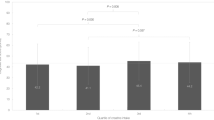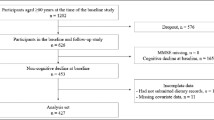Abstract
Purpose
Ageing is associated with loss of cognitive function and an increased risk of dementia which is expected to place growing demands on health and long-term care providers. Among multiple causative factors, evidence suggests that cognitive impairment in older subjects may be influenced by diet. The objective of this study was to examine the association between dietary patterns, dietary glycaemic load (GL) and cognition in older Irish adults.
Methods
Community-dwelling subjects (n 208; 94 males and 114 females; aged 64–93 years) were analysed. Dietary intake was assessed using a validated semi-quantitative food frequency questionnaire. Cognitive capacity was tested using the Mini-Mental State Examination (MMSE). The data were clustered to derive patterns of dietary intake. Multivariable-adjusted logistic and Poisson regression models were used to examine the relationship between dietary GL and MMSE score.
Results
Elderly subjects consuming ‘prudent’ dietary patterns (high in fruit, vegetables, fish, low-fat dairy and salad dressings and low in red meat and white bread) had higher MMSE scores (better cognitive function) than those consuming ‘Western’ dietary pattern (high in red meat and white bread and low in fruit and vegetables; P < 0.05). Logistic and Poisson regression analyses both indicated that the MMSE score was inversely associated with the GL of the diet (P < 0.05) even after adjusting for age, gender, diabetes, hypertension, healthy food diversity, nutritional status, residential property price, cardiovascular medications and energy intake.
Conclusion
In this community-dwelling elderly Irish cohort, consumption of a high glycaemic diet is associated with poorer cognitive performance as assessed by the MMSE.
Similar content being viewed by others
References
WHO/Global health and aging. In: WHO. http://www.who.int/ageing/publications/global_health/en/
Life expectancy (LE) and Healthy Life Years (HLY) in the European Union, 2008–2010. http://www.eurekalert.org/pub_releases/2012-04/ind-le041812.php
McGuire LC, Ford ES, Ajani UA (2006) Cognitive functioning as a predictor of functional disability in later life. Am J Geriatr Psychiatry 14(1):36–42
Allès B et al (2012) Dietary patterns: a novel approach to examine the link between nutrition and cognitive function in older individuals. Nutr Res Rev 1(1):1–16
Parrott MD, Greenwood CE (2007) Dietary influences on cognitive function with aging. Ann NY Acad Sci 1114(1):389–397
Francis H, Stevenson R (2013) The longer-term impacts of Western diet on human cognition and the brain. Appetite 63:119–128
Kanoski SE, Davidson TL (2011) Western diet consumption and cognitive impairment: links to hippocampal dysfunction and obesity. Physiol Behav 103(1):59–68
van Dam RM et al (2002) Dietary patterns and risk for type 2 diabetes mellitus in U.S. Men. Ann Intern Med 136(3):201–209
Steyn NP et al (2004) Diet, nutrition and the prevention of type 2 diabetes. Public Health Nutr 7(1A; SPI):147–166
Torres SJ et al (2012) Dietary patterns are associated with cognition among older people with mild cognitive impairment. Nutrients 4(11):1542–1551
Foster-Powell K, Holt SH, Brand-Miller JC (2002) International table of glycemic index and glycemic load values: 2002. Am J Clin Nutr 76(1):5–56
Barclay AW, Brand-Miller JC, Wolever TM (2005) Glycemic index, glycemic load, and glycemic response are not the same. Diabetes Care 28(7):1839–1840
Folstein MF, Folstein SE, McHugh PR (1975) Mini-Mental State: a practical method for grading the cognitive state of patients for the clinician. Pergamon Press
Mungas D (1991) In-office mental status testing: a practical guide. Geriatrics 46(7):54
Coffee N et al (2013) Relative residential property value as a socio-economic status indicator for health research. Int J Health Geogr 12(1):22
Vellas B et al (1999) The mini nutritional assessment (MNA) and its use in grading the nutritional state of elderly patients. Nutrition 15(2):116–122
Riboli E, Kaaks R (1997) The EPIC project: rationale and study design. European prospective investigation into cancer and nutrition. Int J Epidemiol 26(Supplement 1):S6
Harrington J et al (2008) SLÁN 2007: survey of lifestyle, attitudes and nutrition in Ireland. Dietary habits of the Irish population. Department of Health and Children (ed) Dublin: The Stationery Office
Wrieden W, Barton K (2006) Calculation and collation of typical food portion sizes for adults aged 19–64 and older people aged 65 and over. Final Technical Report to the Food Standards Agency. www.foodbase.gov.uk. 11 Jan 2012
FSA (2002) McCance & Widdowson’s the composition of foods 6th summary edition, R.S.O. Chemistry (ed) Cambridge
Black L et al (2011) Development of an on-line Irish food composition database for nutrients. J Food Compost Anal 24(7):1017–1023
Drescher LS, Thiele S, Mensink GB (2007) A new index to measure healthy food diversity better reflects a healthy diet than traditional measures. J Nutr 137(3):647–651
Claesson MJ et al (2012) Gut microbiota composition correlates with diet and health in the elderly. Nature 488(7410):178–184
Atkinson FS, Foster-Powell K, Brand-Miller JC (2008) International tables of glycemic index and glycemic load values: 2008. Diabetes Care 31(12):2281–2283
Flood A et al (2006) Methodology for adding glycemic load values to the National Cancer Institute Diet History Questionnaire database. J Am Diet Assoc 106(3):393–402
Schakel S et al (2008) Development of a glycemic index database for dietary assessment. J Food Compost Anal 21:S50–S55
Burger KN et al (2011) Dietary glycemic load and glycemic index and risk of coronary heart disease and stroke in Dutch men and women: the EPIC-MORGEN study. PLoS One 6(10):e25955
Livesey G et al (2013) Is there a dose-response relation of dietary glycemic load to risk of type 2 diabetes? Meta-analysis of prospective cohort studies. Am J Clin Nutr 97(3):584–596
Ledikwe JH et al (2004) Dietary patterns of rural older adults are associated with weight and nutritional status. J Am Geriatr Soc 52(4):589–595
Pryer JA, Cook A, Shetty P (2001) Identification of groups who report similar patterns of diet among a representative national sample of British adults aged 65 years of age or more. Public Health Nutr 4(03):787–795
Hamer M et al (2010) Dietary patterns, assessed from a weighed food record, and survival among elderly participants from the United Kingdom. Eur J Clin Nutr 64(8):853–861
Villegas R et al (2004) Dietary patterns in middle-aged Irish men and women defined by cluster analysis. Public Health Nutr 7(08):1017–1024
Gu Y, Scarmeas N (2011) Dietary patterns in Alzheimer’s disease and cognitive aging. Curr Alzheimer Res 8(5):510
Akbaraly TN et al (2009) Education attenuates the association between dietary patterns and cognition. Dement Geriatr Cogn Disord 27(2):147–154
Scarmeas N et al (2006) Mediterranean diet and risk for Alzheimer’s disease. Ann Neurol 59(6):912–921
Zhong Y et al (2012) Hyperinsulinemia, insulin resistance and cognitive decline in older cohort. Biomed Environ Sci 25(1):8–14
Neumann KF et al (2008) Insulin resistance and Alzheimer’s disease: molecular links clinical implications. Curr Alzheimer Res 5(5):438–447
Crane PK et al (2013) Glucose levels and risk of dementia. N Engl J Med 369(6):540–548
Ravona-Springer R et al (2012) Changes in glycemic control are associated with changes in cognition in non-diabetic elderly. J Alzheimers Dis 30(2):299–309
Lamport DJ et al (2009) Impairments in glucose tolerance can have a negative impact on cognitive function: a systematic research review. Neurosci Biobehav Rev 33(3):394–413
Gregg EW et al (2000) Is diabetes associated with cognitive impairment and cognitive decline among older women? Arch Intern Med 160(2):174
Strachan MW et al (2011) Cognitive function, dementia and type 2 diabetes mellitus in the elderly. Nat Rev Endocrinol 7(2):108–114
Luchsinger J, Tang M-X, Mayeux R (2007) Glycemic load and risk of Alzheimer’s disease. J Nutr Health Aging 11(3):238–241
O’Bryant SE et al (2008) Detecting dementia with the mini-mental state examination in highly educated individuals. Arch Neurol 65(7):963
Wengreen HJ et al (2009) Diet quality is associated with better cognitive test performance among aging men and women. J Nutr 139(10):1944–1949
Eskelinen MH et al (2011) Midlife healthy-diet index and late-life dementia and Alzheimer’s disease. Dement Geriatr Cogn Dis Extra 1(1):103–112
Saka B et al (2010) Malnutrition in the elderly and its relationship with other geriatric syndromes. Clin Nutr 29(6):745–748
Coin A et al (2012) Nutritional predictors of cognitive impairment severity in demented elderly patients: the key role of BMI. J Nutr Health Aging 16(6):553–556
El Zoghbi M, Boulos C, Amal AH, et al (2013) Association between cognitive function and nutritional status in elderly: A cross-sectional study in three institutions of Beirut–Lebanon. Geriatr Ment Health Care 1:73–81
Ludwig DS (2002) The glycemic index. JAMA 287(18):2414–2423
Kimura S (2003) Glycemic carbohydrate and health: background and synopsis of the symposium. Nutr Rev 61:S1–S4
Jacob RJ et al (2002) Brain glucose levels are elevated in chronically hyperglycemic diabetic rats: no evidence for protective adaptation by the blood brain barrier. Metabolism 51(12):1522–1524
Trone RJ et al (2009) Glycemic index and glycemic load are not associated with brain lesions in the elderly. JNHA 13(2):117–120
Frisoni GB et al (2007) The effect of white matter lesions on cognition in the elderly: small but detectable. Nat Clin Pract Neurol 3(11):620–627
Yaffe K et al (2004) Diabetes, impaired fasting glucose, and development of cognitive impairment in older women. Neurology 63(4):658–663
Kalmijn S et al (1995) Glucose intolerance, hyperinsulinaemia and cognitive function in a general population of elderly men. Diabetologia 38(9):1096–1102
Gispen WH, Biessels G-J (2000) Cognition and synaptic plasticity in diabetes mellitus. Trends Neurosci 23(11):542–549
Ott V et al (2012) Intranasal administration of insulin to the brain impacts cognitive function and peripheral metabolism. Diabetes Obes Metab 14(3):214–221
Waldstein SR (2003) The relation of hypertension to cognitive function. Curr Dir Psychol Sci 12(1):9–12
Plassman BL et al (2010) Systematic review: factors associated with risk for and possible prevention of cognitive decline in later life. Ann Intern Med 153(3):182–193
Sluijs I et al (2013) Dietary glycemic index, glycemic load, and digestible carbohydrate intake are not associated with risk of type 2 diabetes in eight European countries. J Nutr 143(1):93–99
Dong J-Y et al (2011) Dietary glycaemic index and glycaemic load in relation to the risk of type 2 diabetes: a meta-analysis of prospective cohort studies. Br J Nutr 106(11):1649–1654
Reijmer YD et al (2010) Cognitive dysfunction in patients with type 2 diabetes. Diabetes Metabo Res Rev 26(7):507–519
Watson GS, Craft S (2010) The role of insulin resistance in age-related cognitive decline and dementia. In: Biessels GJ, Luchsinger JA (eds) Diabetes Brain. Humana Press, pp 433–457
Nabb S, Benton D (2006) The influence on cognition of the interaction between the macro-nutrient content of breakfast and glucose tolerance. Physiol Behav 87(1):16–23
Papanikolaou Y et al (2006) Better cognitive performance following a low-glycaemic-index compared with a high-glycaemic-index carbohydrate meal in adults with type 2 diabetes. Diabetologia 49(5):855–862
Greenwood CE et al (2003) Carbohydrate-induced memory impairment in adults with type 2 diabetes. Diabetes Care 26(7):1961–1966
Acknowledgments
This work was supported by the Government of Ireland National Development Plan by way of a Department of Agriculture Food and Marine, and Health Research Board FHRI award to the ELDERMET project as well as by a Science Foundation Ireland award to the Alimentary Pharmabiotic Centre. S.E.P is supported by the Irish Research Council postgraduate scholarship Enterprise Partnership Scheme (in collaboration with Alimentary Health Ltd.) and by the Alimentary Pharmabiotic Centre (SFI Grant No. 07/CE/B1368). All authors are members of the ELDERMET consortium. S.E.P and I.B.J conducted the analyses. S.E.P wrote the manuscript. I.B.J and E.M.O’C conceived and developed the idea for the study. E.M.O’C, I.B.J, P.W.O’T, R.P.R, C.S and G.F.F critically reviewed the manuscript and contributed to its revision. This study is an output of the ELDERMET consortium (http://eldermet.ucc.ie). We are grateful to all those who participated in this study. We are also grateful to Feargal J. Ryan, Hugh M.B. Harris, Patricia Egan, NessaGallwey and Karen O’Donovan for clinical and technical help.
Conflict of interest
The authors declare no conflict of interest.
Author information
Authors and Affiliations
Corresponding author
Electronic supplementary material
Below is the link to the electronic supplementary material.
Rights and permissions
About this article
Cite this article
Power, S.E., O’Connor, E.M., Ross, R.P. et al. Dietary glycaemic load associated with cognitive performance in elderly subjects. Eur J Nutr 54, 557–568 (2015). https://doi.org/10.1007/s00394-014-0737-5
Received:
Accepted:
Published:
Issue Date:
DOI: https://doi.org/10.1007/s00394-014-0737-5




